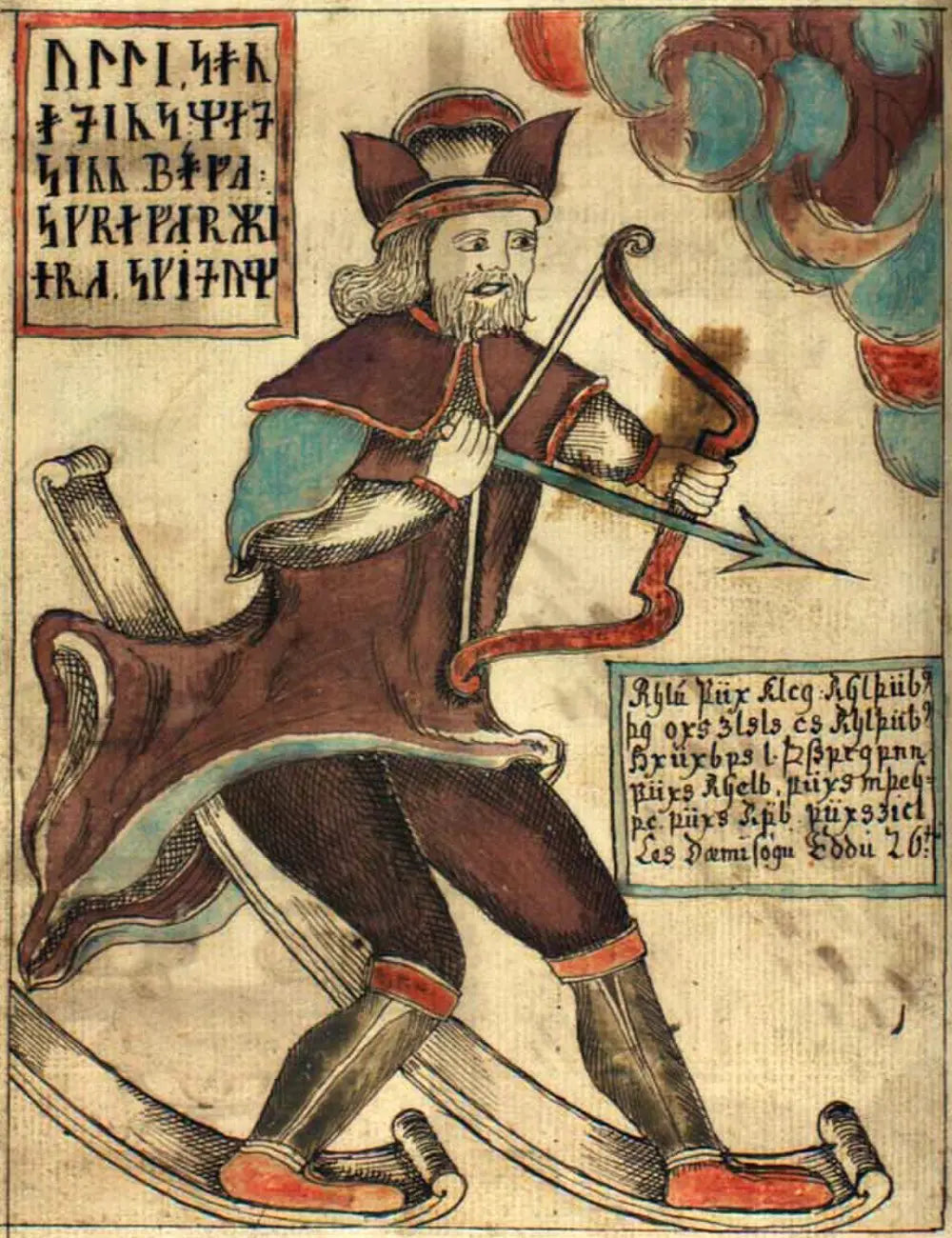Your Cart is Empty
Menu
-
- Shop by Type
- End of Line Sale Items
- New In
- Viking Gifts Under $40
- Hand Forged Axes
- Silver Viking Jewelry
- Stainless Steel Jewelry
- Cremation Jewelry
- Necklaces and Pendants
- Hand Carved Wooden Pendants
- Kings Chains
- Viking Drinking Horns
- Pendant Chains
- Rings
- Bracelets
- Earrings
- Beard Beads and Beard Rings
- Collectables
- Ceramic Mugs
- Street Wear
- Horn Jewelry
- Bronze and Pewter Jewelry
- Shop by Theme
- Viking Axe
- Celtic Jewelry
- Dragon or Serpent
- Viking Raven
- Wolf / Fenrir
- Rune Jewelry
- Odin Jewelry
- Ram / Goat
- Shieldmaidens / Lagertha
- Sword, Spear or Arrow
- Thor's Hammer / Mjolnir
- Tree of Life / Yggdrasil
- Helm of Awe / Aegishjalmur
- Triquetra or Triskelion
- Valknut / Knot of Slain
- Vegvisir / Viking Compass
- Veles / Bear
- Blogs
- Help
-
- Login

Ullr

Uller (Old Norse: Ullr) is in Norse mythology the god of hunting, justice, and winter. He lives in Ydalir and is an excellent archer and skier. He is the son of Sif and stepson of Thor. His father is the jotunn Orvandil. His wife is the giantess Skadi.
As the god of the hunt who excels in the art of bow and arrow maneuvering and skiing, his position in the hierarchy is even more obscure than that of Heimdall, there are no myths about him and in recent times he has remained an unimportant Norse god.
However, his name forms an element in certain Scandinavian toponyms, this evidence suggesting that he was known and worshipped in southern Norway and central Sweden, but not in Denmark. The general conclusion is that in Viking times Ullr was an ancient deity already on the way to oblivion.
In other sources of mythology, it is told that the god for a time reigned in Asgard in place of Odin, who was removed by the other gods in assembly for misconduct in a romance he had.
But Ullr's reign was rather short, lasting only ten years, Odin drove the intruder from Asgard and again occupied the throne. Ullr then went to Sweden, and there he soon gained a reputation as a great sorcerer and magician; he is said to possess a bone on which he has carved magic formulas so powerful that he can use it as a ship, and cross the seas.
Characteristics

Ullr appears only rarely in the preserved written sources, but the meaning of his name suggests that he was once an important god. He was mostly worshipped before the Viking Age and mainly in central Sweden and southern Norway, where place names composed with Ullr's name are common, such as Ullevål, Ullevi, Ullared, Ullensaker and Ullensvang.
The period when farms named Huseby were established is from the first part of the 6th century to the beginning of the 9th century. The period when Ullr sanctuaries, which are preserved in place names, arose is from the beginning of the 6th century to around 850. It seems that the spread of the Huseby settlements and the worship of Ullr followed the young.
Given the significance of Ullr's name, Gro Steinsland believes that he may be an ancient god of heaven and justice.
Folke Ström suggests that Ullr was originally a personification of the sky like Tyr; and since in both Snorri and Saxo he is associated with archery and skiing, he may be a manifestation of the winter sky.
There are few traces of Ullr in place names in Iceland or Denmark. Ström suggests that Ullr's absence from Danish place-name material may mean that his name was simply one of the names of the older Norse sky-god, and that he was identical with Tyr.

Ullr lives in Ydalir, which however is only mentioned in the 5th verse of in Grimnismål in the Old Edda. Here Odin, disguised as Grimne, tells of Ullr's abode, which incidentally is mentioned as number 2 (after Thor's Trudvang) of the twelve god's homes the poem lists, so obviously the god Ullr was important to the poet.
Ullr's ship must have been called Shield, and the bards therefore used the terms "Ullr's ship", "Ullr's boat", "Ullr's vessel" as kennings for shield. However, it may be a misunderstanding of the myth that instead of skiing, Ullr sometimes used his shield as an age board.
Saxo claims in Gesta Danorum that Odin was sent into exile after his assault on the Russian princess Rind in order to beget a son with her to avenge the killing of his son Baldr; and that Ullr in his absence, under the name Ollerus was elected chief and Odin's successor.
Ullr is said to have ruled Asgard for ten years before Odin returned, after which Ullr had to flee to Sweden. There he was killed by the Danes. Steinsland suggests that this account is not merely a relic of Ullr's earlier greater importance, but a reminder of an earlier, now forgotten religious shift in the North.
There are traces in other Norse myths of Odin's temporary absence, such as the time he stayed away so long that his two brothers divided his possessions and his wife Frigg between them. In his attempt to transform the gods into historical figures, Saxo has distorted the content of the original myth and rendered it incomprehensible to us.
Others believe that it reflects a seasonal myth in which Ullr, as the representative of winter, replaced Odin for half of the year, or was the winter aspect of Odin. Both are known by double names (Od or Odin and Ull or Ullin), and both were wizards; Odin practised seidr, e.g. when he attacked Rind, while Ullr was said to be so wizardly that he put across the water on a bone with carved spells, and thus sailed over the waves as fast as on a ship.
The antagonism between the two may be a distant memory of Ullr and other gods like Heimdall and Tyr being supplanted by the warrior-like, one-eyed god with his ecstatic retinue of death gods, hanged men and fallen warriors.
